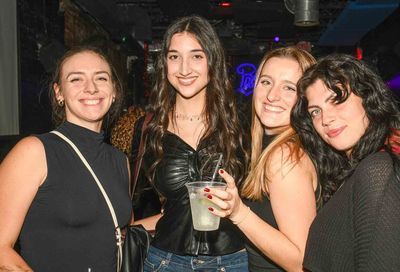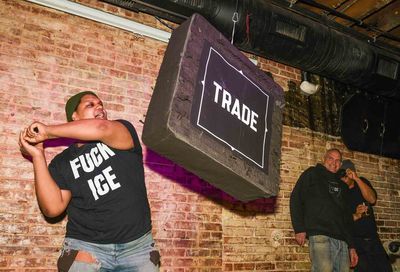Lesbian Cancer Survivor Says She Gets Harassed Using Public Bathrooms
Tiffany Liles-Taylor says she's frequently misgendered and confronted in public spaces after receiving a double mastectomy.

A female cancer survivor who underwent chemotherapy and a double mastectomy says she routinely gets misgendered as a man and has been harassed in public toilets, leaving her with extreme social anxiety.
Tiffany Liles-Taylor, from Enderby, Leicestershire, in the United Kingdom, was diagnosed with cancer in 2020, at the height of the COVID-19 pandemic. The 43-year-old lesbian says she wants to be herself, but is tired of frequently being misgendered, with some busybodies questioning her presence in women’s bathrooms.
Liles-Taylor told ITV that she first noticed a lump in her breast in June 2020. She made an appointment with a doctor, who was unable to tell whether she had a cyst or a cancerous growth, and referred her to a specialist.
After a mammogram, the specialist informed her that she had a lump in each of her breasts, and, following an ultrasound, revealed that the cancer had spread to her lymph nodes. Further tests revealed she had three tumors in total, and that 13 out of 23 of her lymph nodes were compromised. She ultimately consented, with the doctor’s advice, to pursue a double mastectomy and several rounds of chemotherapy and radiotherapy.
Due to her treatment, as well as the social distancing regulations imposed during the COVID-19 pandemic, Liles-Taylor largely stayed home and isolated herself from others, even her family.
“I didn’t leave the house just because I was afraid. My immune system was already weak because of my treatment, so even simple tasks like pressing the button on a traffic light gave me anxiety because I was so afraid of the germs,” she said.
She eventually made a full recovery, but was disheartened to experience people misgendering her because she no longer has breasts.
“I get called Timothy more than Tiffany,” she told ITV in an interview. “I now have high social anxiety because my hair’s still growing back, and I’m quite a masculine female who is in a same-sex relationship — so when people see me and my wife, they automatically assume that I’m a guy.”
She noted that using public, multi-user bathrooms is stressful because other women will challenge her presence in those spaces.
“They will ask me if I’m in the right toilet, or get members of staff to question why I’m there — to which I have to constantly explain that I had cancer, not a sex change,” she said. “It’s that confrontation that I hate. I want people to understand that I am a woman, and I am in the right place.
“I got challenged less when I had no hair and looked like a cancer patient, than now that my hair has grown back, I get challenged a lot,” she added.
Liles-Taylor added that she attempted to dress differently, donning makeup and a wig to make herself appear more “feminine” to outsiders, but doing so made her feel inauthentic.
“I think that people picked up on the fact that I wasn’t being myself, and they’d still automatically treat me different,” she said.
Although she still deals with being misgendered, she has been able to — with the help of the Macmillan Cancer Support center — find a wig that she likes and that feels more authentic when she’s wearing it. The center also helped her obtain a Radar disabled toilet key, which allows her to access any disabled facilities in the country, which helps ease her feelings of anxiety.
Liles-Taylor isn’t the only cisgender female to be harassed in public restrooms for her gender presentation. In November, a woman with short hair recorded herself being harassed by another woman in the public restroom of the Rampart Casino in Las Vegas, Nevada, based on the woman’s assumption that she was transgender. Similar incidents have been occurring for years, dating back to 2016, when a Connecticut cisgender woman was harassed in a bathroom after being mistaken as a transgender woman, due to having short hair and wearing a baseball cap.
Defenders of such harassment argue that they’re only trying to ensure the bodily safety of women and girls in single-sex spaces, essentially writing off such incidents as collateral damage in their war against what they see as encroachment by transgender females.
But the women who are harassed for their gender-nonconformity, like Elise Stonborough, a “butch” lesbian who says she gets confronted about one-third of the time she uses public bathrooms, say they are tired of being misgendered and mistreated. Stonborough, who is also the associate director of policy and research for the LGBTQ organization Stonewall, has resorted to only entering public toilets when she’s accompanied by her girlfriend or a friend who can attest to her gender identity.
“Everyone should be able to access free, safe, clean, accessible, and appropriate public toilets, no matter where or who they are,” Stonbrough told inews in an interview last year.
Support Metro Weekly’s Journalism
These are challenging times for news organizations. And yet it’s crucial we stay active and provide vital resources and information to both our local readers and the world. So won’t you please take a moment and consider supporting Metro Weekly with a membership? For as little as $5 a month, you can help ensure Metro Weekly magazine and MetroWeekly.com remain free, viable resources as we provide the best, most diverse, culturally-resonant LGBTQ coverage in both the D.C. region and around the world. Memberships come with exclusive perks and discounts, your own personal digital delivery of each week’s magazine (and an archive), access to our Member's Lounge when it launches this fall, and exclusive members-only items like Metro Weekly Membership Mugs and Tote Bags! Check out all our membership levels here and please join us today!
























You must be logged in to post a comment.